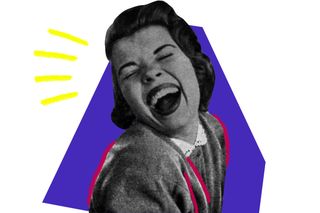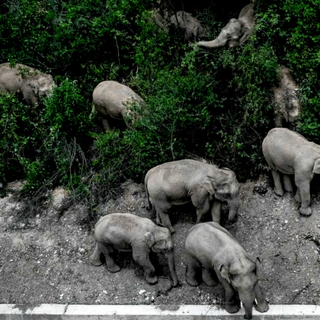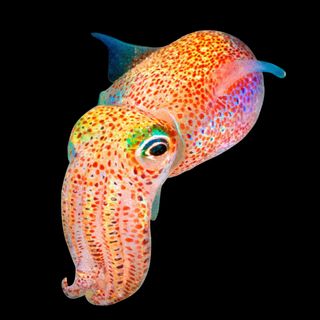
Why We Have Many Different Laughs
Humans have many laughs in our repertoire — influenced by our moods and social settings.

A user posed an intriguing question on the internet some years ago: “Personally I have a bunch of laughs and each one is genuine. I roll the dice each time I hear a joke, and it is kind of fun to see which one I get… I don’t know the scientific reason for this, unfortunately.”
Why we might utter a modest “ha” sometimes and be literally “rolling on the floor laughing” on other occasions has a lot to do with human behavior and psychology. Humans have many laughs in our repertoire — influenced by our moods and social experiences.
“We all have a range of different laughs that we use for different purposes and circumstances,” Judi James, author of The Body Language Bible and body language and behavior expert, told Mashable.
Anatomically, we know laughter is a result of the limbic system, larynx, lungs, respiratory muscles, and more at work. When it seems like our laugh has changed, it’s usually when we change to a different vocal tone depending on our mood. If we’re having a bad day, our tone reflects the grumpiness and our laughs can be dim and mellow — which is often why some people fake their laughs too, a different type of our laugh. Think of varying laughs as different accents, or strains of a theme.
While it may sound obvious that our laughter varies based on how we’re feeling at any given time, what’s interesting is that we still choose to laugh when we’re sad. This also relates to other reasons for why our laughs vary across circumstances: laughter is contagious and is fuelled by our social interactions. “The necessary stimulus for laughter is not a joke, but another person,” Robert R. Provine, laughter expert and a professor at the University of Maryland, U.S., explained in an article in Current Directions in Psychological Science.
Related on The Swaddle:
Why Some People Laugh at Inappropriate Times
Laughing is but a learned experience — that’s also why sometimes we come to mirror the laughs of our close friends or family members. Other times, reasons for our amusement may extend beyond basic humor. “Most are within the ‘social masking’ spectrum — that is, we do them to be polite or to create social bonds.” This is evident if we observe our laughs when we’re alone: studies have shown that people are more likely to laugh in response to a video clip with canned laughter than to one without a laugh track and that people are 30 times more likely to laugh in the presence of others than alone.
Since we learn to laugh in different ways, our laugh varies with the social setting. If Shakespeare were to ask “what’s in a laugh,” the answer would be our personality. Think: professional situations or formal parties. On the contrary, when we’re less conscious and are relatively free of inhibitions, our laughs become spontaneous “giggles.”
Several linguists have equated laughing with languages; the concept of “code-switching” is interesting to look at here, as experts note we code switch either to fit in better. We may “laugh-switch” for similar reasons too. Laughter may have evolved as a way to enhance connectedness in societies.
A friend once confessed to not remembering when they last laughed “genuinely.” The question then is: Do we even know what our “real” laugh sounds like?
“The only really authentic laugh will emerge spontaneously, and that’s when we know what we really sound like. This genuine laugh often embarrasses us, as it sounds or looks pretty gross, often involving snorting noises and over-wide opening of the mouth,” Judi James noted. The next you wonder which laugh is genuine, think of the moment you weren’t compelled to cover your face or alter your body language.
But while we may switch between different tones and modulations, experts note that each laugh in our inventory is still similar in fundamental ways. Laughter may have linguistic properties, but it is still limited by the scope of human behavior.
“Laughter — and crying — have more in common with the barking of a dog than speech,” Robert Provine, professor of psychology and neuroscience at the University of Maryland in the U.S., told Mashable, adding: “If we all laughed differently, we could not identify a vocalization as laughter.”
Understanding humor has been a long-drawn pursuit for psychologists, philosophers, and neuroscientists alike. It is perhaps this variation in human behavior that eggs on their fascination. But in the end, we may resort to what the user with the interesting question does: roll the dice on our laugh.
Saumya Kalia is an Associate Editor at The Swaddle. Her journalism and writing explore issues of social justice, digital sub-cultures, media ecosystem, literature, and memory as they cut across socio-cultural periods. You can reach her at @Saumya_Kalia.
Related


Scientists Are Concerned About Elephants Taking ‘Unusually Long’ Treks in China
